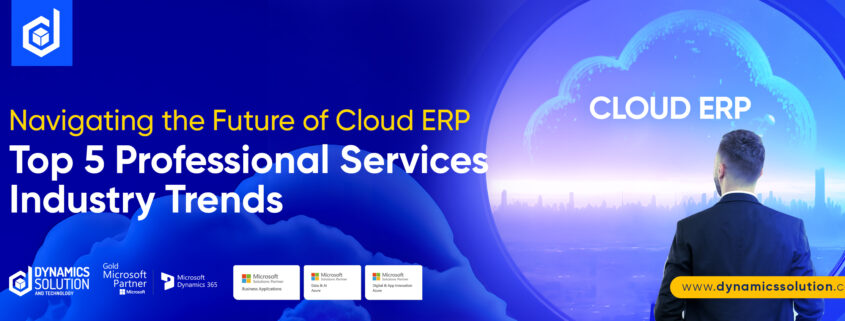As 2024 unfolds, the professional services sector is experiencing swift evolution driven by technological advancements, shifting client needs, and global economic dynamics. In this dynamic milieu, businesses are actively seeking innovative approaches to sustain competitiveness and adapt to emerging trends. At the heart of this transformation lies modern Cloud Enterprise Resource Planning (ERP) systems. Solutions like Microsoft Dynamics 365 suit aims at delivering exponential business growth and project delivery.
This blog will explore the top five trends shaping the professional services industries in the face of cloud ERP in 2024 in helping organizations effectively navigate these changes.
Trend 1: Emphasis on Remote Work and Collaboration
In the past few years, remote work has become increasingly common across many industries, including the professional services sector. In 2024, flexible work arrangements continue to be a priority, with businesses relying more on virtual collaboration tools to enable effective communication among team members and clients. Cloud ERP systems are instrumental in supporting remote work by providing secure access to vital business data regardless of location or time. Features such as real-time data synchronization and collaboration portals allow professionals to work together seamlessly, overcoming geographical limitations.
Trend 2: Enhanced Data Security and Privacy
With the increasing prevalence of cyber threats and data breaches, data security and privacy have become top priorities for professional services firms. In 2024, industry leaders are investing in modern Cloud ERP solutions with advanced security features to safeguard sensitive information and maintain client trust. These solutions offer robust encryption protocols, multi-factor authentication, and continuous monitoring capabilities, ensuring that critical data remains protected against unauthorized access or malicious attacks. By leveraging Cloud ERP’s built-in security measures, organizations can mitigate risks and demonstrate compliance with stringent data protection regulations.
Trend 3: Personalization and Client Experience
In today’s competitive marketplace, clients expect personalized experiences tailored to their unique needs and preferences. Professional services firms are leveraging modern Cloud ERP systems to gather comprehensive client insights and deliver customized solutions and recommendations. By integrating Customer Relationship Management (CRM) functionalities within the ERP ecosystem, businesses can build deeper client relationships, enhance customer satisfaction, and drive loyalty. Cloud ERP enables organizations to track client interactions, analyze buying behaviors, and anticipate future needs, allowing them to deliver tailored services that meet and exceed client expectations.
Trend 4: AI and Automation for Efficiency Gains
AI and automation are revolutionizing the professional services sector, offering a transformative impact on workflows, resource management, and overall operational efficiency. In 2024, the adoption of modern Cloud ERP platforms is becoming pivotal for leveraging the capabilities of AI and automation across various facets of business operations, including project management, financial forecasting, and data analysis. These advanced systems utilize AI algorithms to automate repetitive tasks, analyze extensive datasets for patterns and trends, and generate actionable insights crucial for informed decision-making. Through the automation of routine processes and the elimination of manual intervention, Cloud ERP empowers organizations to enhance productivity, reduce operational costs, and deliver superior outcomes for their clients.
Trend 5: Subscription-Based Business Models
Another notable trend in the professional services industry is the shift towards subscription-based business models. Clients are increasingly opting for flexible, pay-as-you-go service offerings that align with their evolving needs and budgets. Professional services firms are responding to this trend by leveraging modern Cloud ERP systems that offer scalability, agility, and cost-effectiveness. Cloud ERP enables organizations to tailor service packages to meet diverse client requirements, adapt to changing market demands, and drive recurring revenue streams. By embracing subscription-based models, businesses can enhance client satisfaction, foster long-term relationships, and achieve sustainable growth.
Microsoft Dynamics 365 Business Central: A Modern Cloud ERP Solution
Microsoft Dynamics 365 Business Central provides professionals with instant access to essential business data, enabling them to make well-informed decisions and swiftly respond to market changes. With the ability to access data in real-time, businesses can maintain agility and effectively adapt to evolving conditions. Additionally, it offers impressive scalability, freeing organizations from the complexities of managing on-premises infrastructure. This scalability empowers businesses to adjust their operations as necessary, whether scaling up or down, thereby supporting growth initiatives and optimizing resource allocation.
Integration and interoperability are fundamental features of D365, allowing seamless connectivity with other business systems and applications. This integration creates a unified ecosystem that streamlines operations and enhances data management efficiency. By consolidating various systems into a single platform, it enables smoother workflows and better collaboration across departments.
D365 stands out for its cost-effectiveness when compared to traditional on-premises systems. By eliminating the requirement for upfront investments in hardware and software, it significantly reduces capital expenses and ongoing maintenance costs. This affordability not only makes D365 accessible to businesses of varying sizes but also levels the playing field, allowing even smaller organizations to harness advanced ERP capabilities.
Dynamics Solution and Technology – Helping Business Undergo Transformation
As the landscape of professional services continues to undergo transformations, it becomes imperative for organizations to adopt modern Cloud ERP solutions to uphold competitiveness and facilitate growth in the foreseeable future. Microsoft Dynamics 365 encompasses a myriad of advantages crucial for thriving within the dynamic contemporary business milieu. However, the implementation process is full of its own intricacies and requires a professional implementation partner to move through the process.
Dynamics Solution and Technology adeptly responds to emerging industry trends, fosters collaboration among teams, streamlines operations to enhance efficiency, and elevates client experiences to unprecedented levels of excellence.
The crux lies in the selection of the appropriate Cloud ERP partner—one equipped with the requisite expertise and capabilities to tailor solutions in accordance with the distinctive needs and challenges encountered by professional services firms. With a strategic approach towards the adoption of technology, our Microsoft-licensed experts can effectively leverage Cloud ERP to navigate through the evolving industry landscape with assurance. By embracing innovation and maintaining a proactive stance, professional services firms can position themselves as frontrunners within their respective domains, thereby propelling sustainable growth and achieving enduring success in the years ahead.






